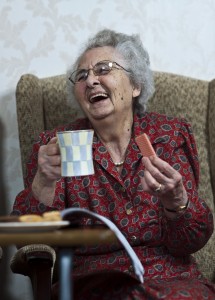 In a digital newsletter just now I set out some tips for looking after older relatives who come to spend a family Christmas, but I forgot to include one very important one! It’s this – confiscate the Smart Phones, i-Pads and Tablets, and hide them for the whole of Christmas day! Nothing will make Grandma or Granddad feel more excluded than being ignored by family members who seem to be inhabiting a parallel universe! More than the most expensive present; more than anything else in the world, the greatest gift this Christmas is that of yourself – your listening ear, your attention, and your interest.
In a digital newsletter just now I set out some tips for looking after older relatives who come to spend a family Christmas, but I forgot to include one very important one! It’s this – confiscate the Smart Phones, i-Pads and Tablets, and hide them for the whole of Christmas day! Nothing will make Grandma or Granddad feel more excluded than being ignored by family members who seem to be inhabiting a parallel universe! More than the most expensive present; more than anything else in the world, the greatest gift this Christmas is that of yourself – your listening ear, your attention, and your interest.

The other tips are –
- Make sure Grandma has a comfortable chair with a cushion or two for back support, and a footstool, if liked.
- Make sure that spectacles and hearing aids are not forgotten.
- A crowded room can become uncomfortably warm, and someone will open a window. But older people need to be warmer than most, so make sure they are not in a draught and think about covering their shoulders with a warm shawl or blanket.
- Most older people don’t like loud, dissonant music. Play the traditional carols until Grandma goes for an afternoon nap, then let the younger folk have their more boisterous music.
- Suggest to everyone that when they talk to Grandma they look into her face, make good eye contact, and expect conversations to take more time with her than they would with each other. This is especially important if there are lively, loud conversations in the background!
- But remember, too, that many older people like to sit and just observe quietly for a while.
- Make sure that they drink enough fluids and have a steady side table to put a cups of tea (and mince pies) on.
- If a teenager has given up his bedroom, it may be an idea to check what’s up on the walls. Posters of Zombies or other lurid pictures don’t make for a good sleep for Grandparents.
- Leave a light on and ensure there are no trip hazards for nocturnal visits to the bathroom.
- If there are younger children, say, under the age of 10, sit them down with a colouring book or something to occupy themselves near Grandma. Older people and younger children get on fabulously well.
YOU’RE AN IMPORTANT ROLE MODEL!
Family members who haven’t seen an elderly relative for a while can be taken aback by the changes that ageing has brought. If Grandma is slower to respond or answers questions wrongly (or not at all), they may assume that she’s suffering from dementia. But more often than not it’s physical frailty that is slowing down mental processes. Or there may be disorientation in being out of her own home and routine.
If this is the case, beware! It’s important that older people are treated with respect, and not talked down to or ‘infantilised.’ As one of our care home residents told me, ‘I may be 105, but I am still ME!’ If you’re the family member in charge, others will take their cue from how you behave.
It’s important, because the feedback a person receives shapes their view of themselves. It’s particularly true of older people. Findings of a recent American showed that people who have been conditioned to think they are physically and mentally decrepit in old age are stressed by negative thoughts that can actually alter the structure of the brain and trigger dementia. In contrast, optimistic and active individuals who refuse to conform to age stereotypes are likely to stay mentally alert for longer. Read about the report here: http://www.telegraph.co.uk/news/health/elder/12037426/Lack-of-respect-for-elderly-may-be-fuelling-Alzheimers-epidemic-warn-scientists.html?dm_t=0,0,0,0,0
If you’re visiting relatives with dementia, I can’t recommend strongly enough reading our book, ‘Visiting People with Dementia.’ It will help make the visit meaningful, for
both of you. It’s been written by Janet Jacob, a former care home manager and psychogeriatric nurse. Her own mother had dementia before she died so Janet writes from personal as well as professional experience. You can get a copy (only £3) through our website: www.pilgrimsfriend.org.uk.
Importantly, don’t think that just because the person may not remember your visit that it wasn’t important to her or to him.
Also, if you have older relatives living a distance away, why not set them up with Age UK’s ‘Breezie’ tablet? It’s designed to be very easy to use for non-techie seniors, and you’ll be able to keep in touch with face to face conversations! Read about it here: http://www.breezie.com/
Christmas is a time for being grateful. I reckon Psalm 103: 1-5 should be set to Christmas music!
‘Bless the Lord, O my soul,
And all that is within me, bless His holy name.
Bless the Lord, O my soul,
And forget none of His benefits;
Who pardons all your iniquities,
Who heals all your diseases;
Who redeems your life from the pit,
Who crowns you with lovingkindness and compassion;
Who satisfies your years with good things,
So that your youth is renewed like the eagle.’ Psalm 103: 1-5 (NASB)














